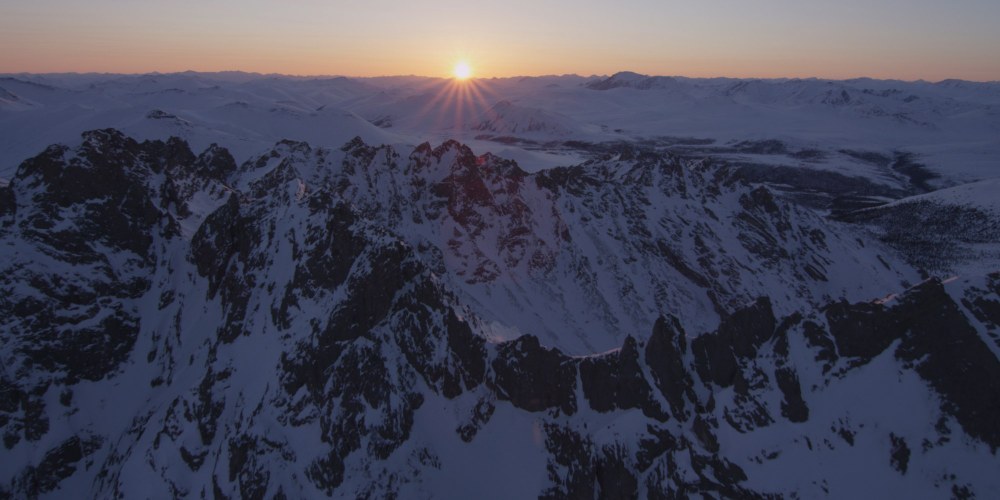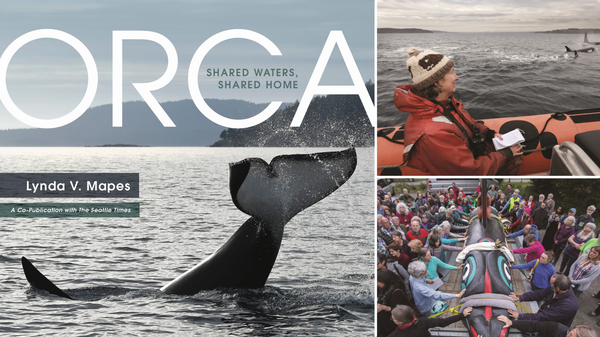
Braided River, the conservation imprint of Mountaineers Books, tells visual stories that inspire a wide audience to protect our communities, lands, and wildlife. By taking book projects and turning them into events, regional and national media coverage, and museum exhibits, they create a diverse toolset to raise awareness for conservation causes and threats to wild places. Given the interconnected threats of the climate and biodiversity crises, Braided River’s work of inspiring action on conservation issues near and far is more important than ever.
The following are excerpts from a recent conversation with Braided River’s Helen Cherullo (HC) and Erika Lundahl (EL).
What makes Braided River special?
Helen Cherullo, Executive Director: Our work begins with a book, as we like to say. The expertise of Mountaineers Books established the foundation that we built Braided River from, allowing us to create rich stories in a beautiful and compelling format, with stories and themes that will stand the test of time. Our ability to market these books really sets us apart as well.
Erika Lundahl, Conservation Impact Manager: Everyone who loves the outdoors has a role to play in protecting it. We all have different gifts to bring to the table, and Braided River’s gifts go beyond publishing. We’re a convener of storytellers, photographers, frontline conservation groups, and the recreation community. By using storytelling to reflect many different voices and perspectives, we can help build a bigger tent of advocates working to protect beautiful places in western North America.
Could you share more about Braided River’s current campaigns and activities? What role do partnerships play in those efforts?
EL: One of our biggest campaigns close to home in the Pacific Northwest is based on our award-winning book, ORCA: Shared Waters and Shared Home, and our collaboration with the Seattle Times. The book and campaign tell the story of Southern Resident Orca Whales and Chinook Salmon — two keystone and interdependent species in our region. The book has stunning visuals from the Seattle Times and others, and is written by award-winning journalist Lynda Mapes. Thanks to partners like Save Our Wild Salmon, books were presented to legislators and decision-makers across the West to support advocacy for the orca and the salmon. We’ve also created a touring exhibit with marine centers in our regions, including at the Seattle Aquarium. We encourage everyone to go check out whichever exhibit is closest to you!
HC: Many of our campaigns from previous years are still ongoing. We’ve produced five books over the course of the last 20 years that relate to the Arctic Refuge — it's our signature campaign. Sometimes we're asked why we do so many books on Alaska, but in truth there is an interconnected nature of all of these important issues in the West.
 ORCA Cover photo by Dave Ellifrit. Photo of orcas and event by Steve Ringman.
ORCA Cover photo by Dave Ellifrit. Photo of orcas and event by Steve Ringman.
Can you share any stories from the past year that underscores how important this work is?
HC: In late 2020 and early 2021, there was a real risk of seismic testing by the previous administration on the coastal plain of the Arctic National Wildlife Refuge. This would have left permanent scars on the landscape, been a threat to denning polar bears, and the first step toward drilling. Braided River is part of an IMAX ® film advocacy team along with Project Impact, led by Campion Advocacy Fund, in collaboration with the Arctic Refuge Defense Coalition. As some readers may have seen, the best chance we had to stop these harmful actions was to provide comments to the U.S. Fish and Wildlife Service.
The campaign organized a Tik Tok call-to-action using film footage to drive younger individuals to submit comments. Over the course of a month the footage went viral and helped generate more than 6.3 million public comments — more than any Department of the Interior comment period in history. Our “Protect the Arctic” team made that happen.
How has the shifting political landscape changed which conservation issues or threats to wild places come into focus for your work?
EL: While the tenor of conservation policy at the federal level has shifted, our approach hasn’t. Administrations come and go, but the visual stories we tell about biodiversity and intact landscapes, wildlife, and healthy and sustainable communities and economies — the reasons why a place is important — stay the same. The threats remain. Tactics shift, but our work stays steady because we’ve always centered the importance of collaboration across political party and demographic lines. That’s been part of our story from the beginning.
HC: I'm seeing more collaboration across the conservation community, more of a desire to form coalitions. This is really encouraging, and can make Braided River’s work more relevant. Organizations are coming to us now and saying, “we need a Braided River project.”
How does the climate crisis continue to shape Braided River’s products and campaigns?
HC: From the very beginning, we focused our books around two interconnected themes: climate change and the loss of biodiversity.
EL: The realities of climate change permeate all of our work. More and more of our campaigns center how climate impacts to landscapes also impact communities. Braided River’s strength is in visually showing the resiliency of these communities, and tangible solutions for how to adapt while also fighting to preserve these places that are essential for fighting the climate crisis as a whole.
What Braided River campaigns can we look forward to over the next few years?
HC: We have so many great efforts on the horizon, but two upcoming book projects and campaigns that are especially grounded in the natural beauty of our region as well as conservation threats are on the Columbia River and Olympic Peninsula. We want to tell the most comprehensive story of the life and land of these places and communities, and be poised to support ongoing conservation efforts, whether it be wild and scenic rivers, new protected areas, tribal efforts for salmon recovery, or clean energy solutions.
How can Mountaineers members get more involved with Braided River and its campaigns?
HC: Sign up for our Braided River mailing list, and follow us on social media (Facebook and Instagram) to stay connected to what we’re working on and receive up-to-date information. Take action! Every voice matters. We also encourage Mountaineers to attend book and photographer events, as well as partner events, which are great opportunities to connect to consequential conservation issues and the inspiring people working on them in the region, and throughout western North America.
EL: Our slogan at Braided River is “changing perspectives.” You can help change perspectives by buying a book and putting it in the hands of someone new. You have the power to help open and inspire their views on a place and expose them to its beauty.
For more information visit www.BraidedRiver.org.
 Conor Marshall
Conor Marshall
